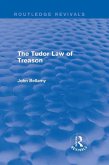Describing many high-profile prosecutions and trials, the book focuses on the statutes, ordinances and customs that have at various times governed, limited and shaped this worst of crimes. It explores the reasons why treason coalesced around specific offences agreed by both the monarch and the wider political nation, why it became an essential instrument of enforcement in high politics, and why, over the past three hundred years, it has gradually fallen into disuse while remaining on the statute book. This book also considers why treason as both a word and a concept remains so potent in wider modern culture, investigating prevalent current misconceptions about what is and what is not treason. It concludes by suggesting that the abolition or 'death' of treason in the near future, while a logical next step, is by no means a foregone conclusion.
The Rise and Fall of Treason in English History is a thorough academic introduction for scholars and history students, as well as general readers with an interest in British political and legal history.
Dieser Download kann aus rechtlichen Gründen nur mit Rechnungsadresse in A, B, BG, CY, CZ, D, DK, EW, E, FIN, F, GR, HR, H, IRL, I, LT, L, LR, M, NL, PL, P, R, S, SLO, SK ausgeliefert werden.
Sir Stephen Sedley, "Boil the Cook," London Review of Books, 18 July 2024 (Vol. 46/14).
"The book offers 'a framing narrative which takes the story of English treason from its Anglo-Saxon roots right up until yesterday... This long story [of treason] needs to be told, because treason is too often seen in the snapshot of a particular moment... We try 'to give a picture of English treason almost before the word "treason" existed', move on 'through the Norman Conquest, into the medieval period, where the word itself began to appear and it became an articulated crime', and then range far beyond."
James Sewry, "In Conversation with Mark Nicholls," The Historian, Summer 2024 (Issue 162)
"A work on treason in the British Isles over the last 1,000 years is a must read...We see a shift - the important thing for those in power is to protect their own control over information flows, even such things as revelations in the media or memes in social media. Boyer and Nicholls note that treason laws no longer appear to be considered a legally useful tool. Accusations of treason require that during the trial one discusses what is in the country's interest. Easier then to assume that certain things must not be said - because they are "secret" or "false". But it should be noted that this study can also be read as pure relaxation - it is filled with fascinating stories of how the laws have been twisted throughout history, such as when Henry VIII enforced that murder by poison should be considered treason. The punishment? To be boiled to death."
Boris Benulic, Epoch Times (11 September 2024)
"This fascinating new book charts the law of treason throughout more than 1,500 years of English history. It is a well-presented volume (also available as an e-book) with a useful, up-to-date bibliography. This is a welcome new intervention in the field; medievalists will know of John Bellamy's work on medieval and Tudor use of treason law, but both of his volumes were published in the 1970s. More recent studies have dealt with period-specific contexts, such as D. Alan Orr's study of treason in the English Civil War (2002). Here, though, Allen Boyer and Mark Nicholls demonstrate how the law of treason operated within a broader legal and political context, drawing out themes which recurred over the centuries, such as the balance between punishment and mercy, and the language of the 1352 Treason Act. The book is organised as a chronological narrative in seven chapters (three medieval, and one each on the Tudor period, the Civil War, the eighteenth century and the modern period), but with helpful thematic sub-headings. This chronological approach does lead to occasional repetition (for example about the paucity of sources in the chapters on medieval and early modern contexts). It also means that there is little room to analyse subtleties of language, genre and audience in their primary sources, in the way that Paul Strohm (whom the authors quote in the introduction, p. 6) does so successfully. However, the present volume represents a considerable scholarly achievement."
Helen Lacey, The English Historical Review
"It is not just an introduction, whose chapters might beneficially be assigned to students; for the historian, it provides a trustworthy reference to current thinking across a wide period. Bellamy gets a companion, if not a replacement. This should make the book an important source for some time to come."
Matthew Steilen, University at Buffalo School of Law
"Allen Boyer and Mark Nicholls' broad overview of the rise and fall of treason in English history is...to be welcomed. It will be a boon to scholars, even those who already know quite a bit about the topic, because few possess a synoptic vision over such a vast swathe of time. Treason is where law and politics meet: The law of treason itself has always been shaped by political considerations."
Tim Harris, Brown University
The Rise and Fall of Treason in English History has been cited to the United States Supreme Court, in an amicus brief for TikTok Inc. v. Merrill Garland, on page 5 of Matthew Steilen, a constitutional lawyer and legal historian's brief:
"In essence, a bill of attainder was a means of convicting someone by bill in the legislature. . . . Legal treatises on which the [Constitution's] framers relied also drew a comparison between "attainder" and the Latin attinctus, or "stained," reflecting a view that bills of attainder were reserved for the most infamous traitors. Allen Boyer & Mark Nicholls, The Rise and Fall of Treason in English History 98-110 (2024).
https://www.supremecourt.gov/DocketPDF/24/24A587/335324/20241216201945437_Steilen%20Amicus%20Brief.pdf









